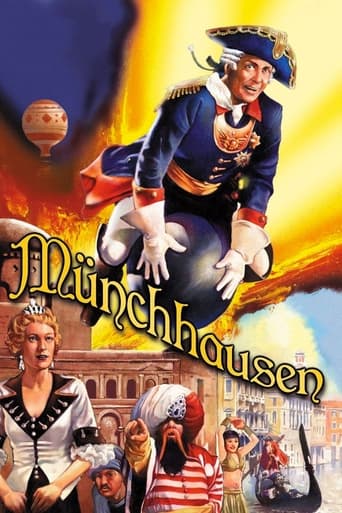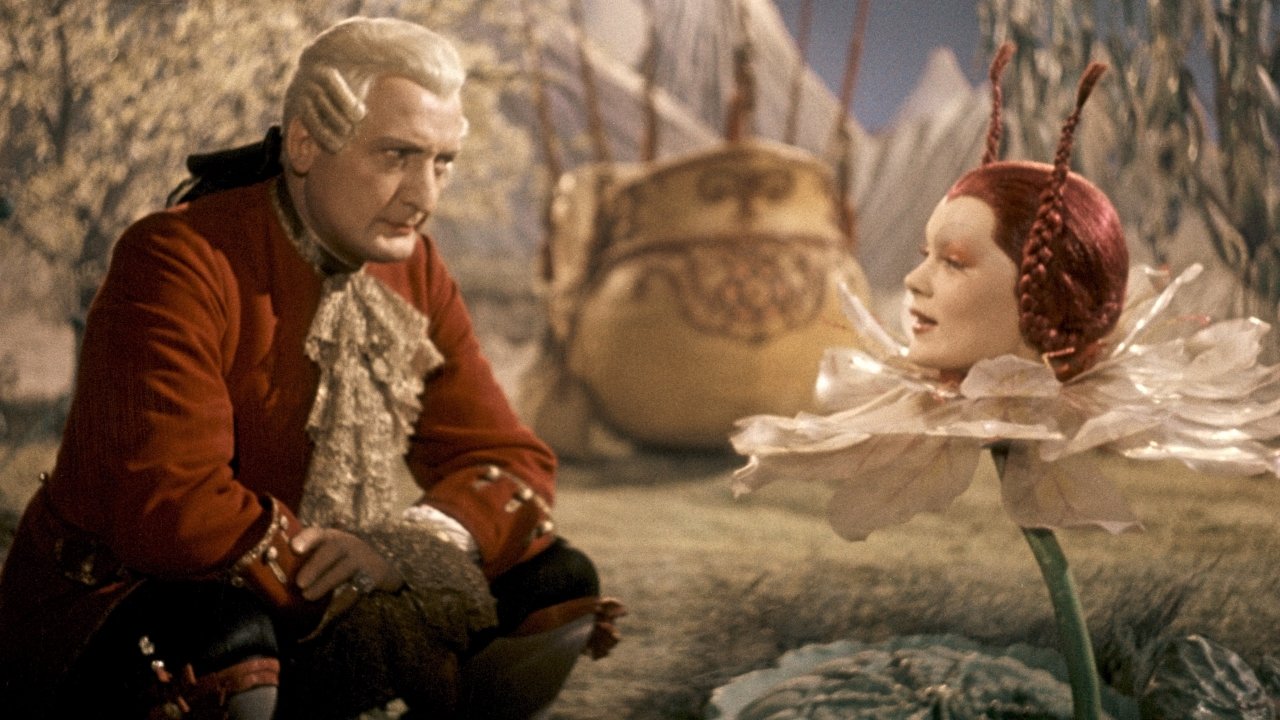Horst in Translation (filmreviews@web.de)
This is Josef von Báky's "Münchhausen", a German film from 1943, so this one is almost 75 years old. And you can't deny that it is ahead of its time in terms of visual effects, costumes, art direction and set decoration and last but not least the use of color. But the result is as well that the film, in my opinion, almost entirely relies on the stylistic side here and it does not deliver a story that is on par. Münchhausen is a character that is still very well known today, at least here in Germany and here we find out about his adventures that lead him as far as to the moon. This 110-minute movie is possibly the defining career role for lead actor Hans Albers, one of the biggest (if not the biggest) stars in German film from his era. If you see the year 1943, you will realize that this film came out during World War II, when the Nazis were still in charge. Nonetheless, compared to the despicable propaganda films that came out at the same time, this movie is pretty much entirely apolitical, which I find positive and surprising. The German population certainly needed some comic relief in the face of the possibly darkest days in history. And they may have received it thanks to how stunning this film looks. Good for them. But for us, not so much. I cannot say that this film has aged particularly well, even if the moon sequences were sort of memorable. All in all, it turns out a forgettable case of style over substance that lacks a lot in terms of story-telling. In my opinion, the film dragged way too much to let me recommend it. Watch something else instead.
dlee2012
This film may well be the only piece of worthwhile culture to come out of the Nazi regime. Little wonder as many of the cast and crew had previously been blacklisted by the Party and were thus intent to create a work that did not reflect Hitler's ideology. Indeed, at times they manage to subvert it, with some explicit statements against imperialism and in favour of racial equality slipping past the censors.Münchhausen's decision to age and die at the end stands in contrast to Hitler's determination to build a thousand-year Reich and both Turks and blacks are depicted as noble, virtuous and intelligent people.Reality, illusion and delusion frequently blur throughout the film, and this tone is set from the start with the oft-discussed scene in which the 18th Century ball is revealed to actually be a present-day costume party.Erich Kästner (who also wrote the beloved children's story Emil and the Detectives) produced the script which brings the essence of the Münchhausen story faithfully to life, each lie becoming more and more deliciously outrageous, culminating in the famous visit to the moon.Hans Albers is perfectly cast, while Brigitte Horney and Marina von Ditmar are two of the most beautiful female leads ever to grace a German film.Colour is used effectively, the bright pastels bringing the film's fantasy world vividly to life as the audience is transported to exotic realms. This would have stood in contrast to life in the Reich as the tide of the war turned against Germany and the horrific carpet bombings began. A piece of escapist fare such as this would, presumably, have provided great comfort at this time, though, of course, Goebbels' original aim had been to simply reflect the glory of the Reich and compete directly against Hollywood's Wizard of Oz.Ultimately, though, this film stands alone as a worthwhile work, suitable for the entire family. As mentioned previously, it makes some strong criticism of war and imperialism that adults will appreciate and creates vivid fantasy worlds for children. Indeed, one could make a case for this being the greatest fantasy film of all time.
bkoganbing
You've got to hand it to that Josef Goebbels. When the little club footed maniac wasn't busy trying to get into the pants of every starlet of the German cinema, his UFA Studios could turn out some good work. Such is the case of the lavish spectacle Munchhausen. The color cinematography and special effects definitely equal the quality of anything Hollywood could do.The Munchhausen Stories in German culture are akin to Jonathan Swift's Gulliver's Travels. The author Rudolf Erich Raspe was trying for Swift like satire of the political events of his time. In time though they became beloved for their face value alone. In fact the protagonist became a synonym, Munchhausen's syndrome is a diagnosis for one who tells exaggerated stories or outright lies the better to ingratiate themselves with another individual or a group.In fact at the same time that German romantic cinema star Hans Albers was doing Munchhausen over in Germany, a different kind of Munchhausen was popular in America. Jack Pearl, a former vaudevillian, had a radio series based on the Munchhausen character and his famous line to those who questioned the authenticity of his stories was "Vas you dere Charlie". Quite popular back in the day.The story of the fabled Munchhausen is told in flashback during a party in modern Germany by the current Baron Munchhausen . By the way, another reviewer said that it would be Germany in the Thirties before World War II started. Not necessarily because the Nazi regime was notorious for not asking the kind of sacrifices demanded of its civil population until late in the war. Such a lavish type party was definitely in keeping with the regime's culture of the time.Though Goebbels kept it light as he did most of UFA's product except those that were outright propaganda, they did get their shots in. During the part of the film concerning Munchhausen's visit to Imperial Russia, the German background of Catherine the Great played by a fetching Brigitte Horney is emphasized. Catherine was a name she took when she married the Czar, she was in fact Sophia of Anhalt-Zerbst. Also there is a scene when Pugachev, the peasant leader of a revolt in Siberia, is brought in caged like an animal and looking like something from Dr. Moreau's laboratory. Pugachev was later played by Van Heflin in the film Tempest in the next decade. The caricature was definitely in keeping with the Nazi ideas to depict Slavic people as some kind of subhumans, almost as bad as Jews.Throughout the film as Munchhausen travels from St. Petersburg, to Istanbul, to Venice and even the moon, Albers's faithful sidekick is Herman Speelmans who is like Sancho Panza or even Gabby Hayes if you will. Speelmans does a fine job and dies on the moon in a beautifully played scene.As the propaganda is kept to a minimum, Munchhausen has survived to be appreciated on its own merits which are considerable.
MartinHafer
Considering that this film was made in Nazi Germany during the middle of WWII, I expected the film to be a dogmatic piece of propaganda. Surprisingly, despite its pedigree, it was a wonderful piece of escapist fantasy and seemed to have nothing to do with the Nazi regime. In fact, a writer whose works were burned by the Nazis is the man responsible for this screenplay (though, of course, under a pseudonym). So my advice is try to forget when it was made and just sit back and enjoy.Baron Munchausen was, despite the weirdness of the film, was a real adventurer and war hero. In real life, he tended to greatly exaggerate his exploits and this was the basis for later stories of his life.In this film, the movie starts in the present day (1943), but it was brilliant how the writer and director made it look like it was in the 17th or 18th century. This was very clever. Then, when a party guest begs the host to tell them about the exploits of his ancestor (Munchausen), the story of Munchausen's adventures begins. This is a wonderful way to both introduce and conclude the film and makes this aspect of the film better than the 1988 version of Baron Munchausen. Now this isn't to say the 1943 version is superior overall--it certainly isn't. In fact, BOTH are extraordinary films and I recommend you see both. However, if you can only see one, try the 1988 version by Terry Gilliam first, as the story itself is a little more action-packed and the special effects are truly amazing even today, whereas the 1943 film at times looks a bit "cheesy"--mostly because special effects of the day just weren't up to the story in a few places (since it was SO weird and over-the-top).PS--A note to parents--there is some nudity in the film, which is surprising considering this seems to be a family-oriented film. While not super-graphic, you do see a lot of topless harem girls during one scene. It's really a shame, as it doesn't exactly fit in with the rest of the film, though compared to some newer films the nude scene is rather tame. However, you should consider this when you think about having your kids watch the film.


 AD
AD
